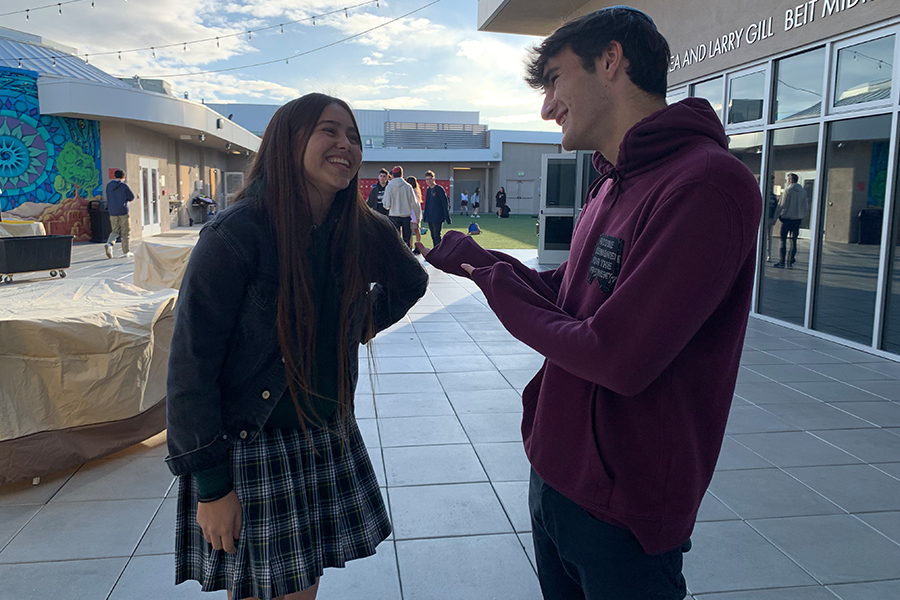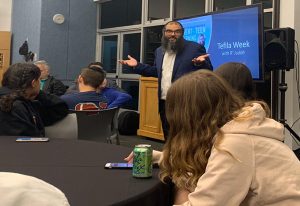Rabbi Tsaidi’s Gemara classes work on improving mitzvah observance
FRIENDS: Juniors Alessandra Judaken and Lenny Wolkind talked on the turf last week. As part of the avodat hanefesh unit for Rabbi Tsaidi, Alessandra decided to focus on shomer negiah.
February 23, 2020
Rabbi Yagil Tsaidi has started a mitzvah program that promotes doing meaningful but small things, so students can better themselves over time.
He calls it avodat hanefesh, which literally means service of the soul — though it doesn’t exactly translate.
“I call it avodat hanefesh, which means, like, working on your soul,” Rabbi Tsaidi said in an
interview. ”I mean, someone should be proud of themselves but there is always, always room for improvement.”
To make this happen, Rabbi Tsaidi last fall asked students to choose three mitzvot to do every day for three months. Things like giving tzedakah (charity), wearing tzitzit and davening (praying) twice a day were each assigned a certain number of points, and to earn the points, the student must perform the mitzvah every day
How many points each one is worth depends on how far out of their way the person has to go to fulfill it, Rabbi Tsaidi said. For example, tzedakah is worth one point because any shul you go to, there is a tzedakah box, but it isn’t always easy resisting the temptation of using your phone on Shabbat, so that’s worth more.
Students who earn eight points will be invited to a dinner together at La Gondola, he said, but the reward is not the point of the exercise.
“The reward is a little nudge, a little push,” Rabbi Tsaidi said in an interview with the Boiling Point.
The program’s goal, he said, is to encourage Judaic improvement beyond the classroom. All three of his Gemara classes — two juniors and one sophomore — are participating.
Rabbi Tsaidi said he got the idea from teaching at a yeshiva back when he lived in Israel, but
that his students at Shalhevet helped him realize the necessity of the program here. He thought of it when he noticed that special events he planned didn’t seem to have a long-term effect.
Among these were Mishmar — after-school learning — and hosting celebrations of learning at his home. Such a celebration is called a tisch, literally a rabbi’s “table.”
“I felt like I was having a lot of events that were like a one-off, like a mishmar or a tisch or stuff like that… and kids were singing and we turned the lights off and we’d dance and etcetera, and at that moment, we were all inspired,” Rabbi Tsaidi said.
“It felt like the next day, when I would see the kids who were over that night… like they already [had had] so much school work they forgot about it,” he said. “Like no longer in their head.”
When he started avodat hanefesh, Rabbi Tsaidi first suggested a few basic mitzvot, like tzedakah (donations to charity), but then opened the floor to suggestions from his students. Some proposed mitzvot like kashrut or tzniut — modesty.
His hope is to make a lasting impact as opposed to a short-lived one, by offering students a way to practice Judaism in small ways, through everyday actions. For some, it seems to be working.
Sophomore Amanda Wannon chose kashrut and Shabbat.
“Some days are harder than others,” said Amanda, “and since I know it’s up to me if I wanna stop or not, I don’t feel so pressured to continue. I like that it’s on my own terms.”
But she did continue to practice them throughout winter break.
Fellow sophomore Haïm Oliel chose two mitzvot: wearing tzitzit and davening twice a day. After a week of doing those things every day, Haim said that he had felt an impact already.
“It’s brought me closer to Judaism and it’s kind of helping me figure out what life’s all about,” said Haïm, “because Judaism is a big part of our lives and I just want to like expand and feel closer to what Judaism is.”
Junior Alessandra Judaken used avodat hanefesh as an opportunity to try out a mitzvah that she had been interested in for a while: shomer negiah, or not touching anyone of the opposite gender.
“A lot of people keep asking me like, ‘Oh, you’re just being shomer negiah just for the sake of the La Gondola dinner,’ and that’s not it at all,‘“ Alessandra said. “I frankly don’t even care if I get it. It’s really just kind of, it was a little push and it was the push that I needed.”
She said she felt holier keeping more distance from her male friends.
“The best part is knowing I can maintain such a strong relationship with them, without touch but connecting through the soul,” Alessandra said.
Rabbi Tsaidi said that the dinner would happen in three to four months so that more students can reach the point goal and attend.
“The goal is to make sure more kids get involved,” said Rabbi Tsaidi.















